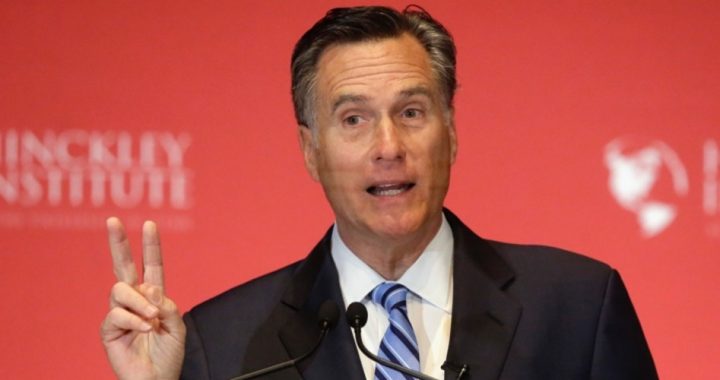
Speaking calmly, yet forcefully, at the Hinckley Institute at the University of Utah in Salt Lake City on March 3, former Massachusetts governor and 2012 Republican presidential candidate Mitt Romney (shown) attacked business magnate Donald Trump’s qualifications to be the Republican Party’s 2016 presidential nominee.
In case there were any misconceptions about the purpose of his speech, Romney started off by stating that he was not there to announce his candidacy for office, or to endorse a candidate today. Yet, while he did not endorse one candidate, he did say that “the only serious policy proposals that deal with the broad range of national challenges we confront, come today from Ted Cruz, Marco Rubio, and John Kasich. One of these men should be our nominee.”
With Dr. Ben Carson just having announced that he is dropping out of the race, Romney could just as easily have said that the nominee should be “anyone but Trump.”
Romney recalled Ronald Reagan’s 1964 nationally televised speech on behalf of that year’s GOP candidate, Senator Barry Goldwater (“which, incidentally, we lost”) and noted that Reagan
challenged America saying that it was a “Time for Choosing.” He saw two paths for America, one that embraced conservative principles dedicated to lifting people out of poverty and helping create opportunity for all, and the other, an oppressive government that would lead America down a darker, less free path. I’m no Ronald Reagan and this is a different moment but I believe with all my heart and soul that we face another time for choosing, one that will have profound consequences for the Republican Party and more importantly, for the country.
While Romney may be no Ronald Reagan, his polished demeanor while delivering this speech could have been described as “Reaganesque,” and he stood in stark contrast to the sometimes abrasive style of the man he was castigating. Though he had just mentioned that he was not announcing his candidacy for office, one could not help but wonder if Romney wasn’t positioning himself as a possible alternative presidential candidate in the event of a deadlocked GOP convention later this year.
After summarizing some of the challenges that will face the next president, including “poverty persists … wages are stagnant”; “the horrific massacres of Paris and San Bernardino, the nuclear ambitions of the Iranian mullahs, the aggressions of Putin, the growing assertiveness of China and the nuclear tests of North Korea,” Romney presented two paths to dealing with these challenges.
The first was, “if we make the right choices, America’s future will be even better than our past and better than our present.”
The alternative path would not be so rosy, however. Romney continued: “On the other hand, if we make improvident choices, the bright horizon I foresee will never materialize. Let me put it plainly, if we Republicans choose Donald Trump as our nominee, the prospects for a safe and prosperous future are greatly diminished.”
Elaborating on his reasons for rejecting Trump, Romney focused on two areas — the economy and national security.
Among Trump’s economic proposals that Romney criticized were his 35-percent “tariff-like penalties” that the former governor said “would instigate a trade war that would raise prices for consumers, kill export jobs, and lead entrepreneurs and businesses to flee America.” Romney also asserted that Trump’s tax plan, “in combination with his refusal to reform entitlements and to honestly address spending would balloon the deficit and the national debt.”
In answer to those who claim that Trump’s success in business make him an expert on economic matters, Romney also disputed those claims, pointing to Trump’s bankruptcies, which he said “have crushed small businesses and the men and women who worked for them.”
Noting that Trump was not a true entrepreneur because he had inherited his business, Romney cited a long string of Trump’s failed businesses, including Trump Airlines, Trump University, Trump Magazine, Trump Vodka, Trump Steaks, and Trump Mortgage before concluding: “A business genius he is not.”
Turning to national security, Romney asserted that “Trump’s bombast is already alarming our allies and fueling the enmity of our enemies.”
As an example of Trump’s foreign-policy missteps, Romney said that “Insulting all Muslims will keep many of them from fully engaging with us in the urgent fight against ISIS. And for what purpose? Muslim terrorists would only have to lie about their religion to enter the country.”
Romney then turned up the heat:
What he said on “60 Minutes” about Syria and ISIS has to go down as the most ridiculous and dangerous idea of the campaign season: Let ISIS take out Assad, he said, and then we can pick up the remnants. Think about that: Let the most dangerous terror organization the world has ever known take over a country? This is recklessness in the extreme.
Donald Trump tells us that he is very, very smart. I’m afraid that when it comes to foreign policy he is very, very not smart.
Romney also asserted that “Donald Trump lacks the temperament to be president,” citing the business magnate’s insensitive remarks towards a disabled reporter, female reporters, and female political rivals as examples.
Increasing the intensity of his condemnations of Trump, Romney said: “Dishonesty is Trump’s hallmark” and cited false claims that Trump had made about “thousands of Muslims in New Jersey celebrating 9/11.” He went on to condemn Trump for his “personal qualities, the bullying, the greed, the showing off, the misogyny, the absurd third grade theatrics.”
Romney detoured a bit to focus on the presumed Democratic nominee, Hillary Clinton, stating:
On Hillary Clinton’s watch at the State Department, America’s interests were diminished in every corner of the world. She compromised our national secrets, dissembled to the families of the slain, and jettisoned her most profound beliefs to gain presidential power.
His purpose in discussing Clinton, noted Romney, was that polls indicate that Trump would lose to Clinton in a presidential election.
“A person so untrustworthy and dishonest as Hillary Clinton must not become president. But a Trump nomination enables her victory,” said Romney.
Winding down his argument with a zinger, Romney asserted:
There are a number of people who claim that Mr. Trump is a con man, a fake. There is indeed evidence of that. Mr. Trump has changed his positions not just over the years, but over the course of the campaign, and on the Ku Klux Klan, daily for three days in a row.
Trump may indeed merit many of the charges thrown at him by Romney, but, in politics, it is always smart to consider the motivations of anyone who goes after a successful candidate. While it is impossible to determine from Romney’s speech what his motivations may be, we must consider that Trump, despite his faults, has challenged the Republican Party’s establishment. We must ask if Romney’s condemnation of Trump was made of his own volition, or if he is serving the interests of the GOP establishment.
While he wisely avoided endorsing anyone else, and even included Cruz, another supposed anti-establishmentarian, among his suggestions as an acceptable alternative to Trump, might Romney’s real purpose be to weaken Trump just enough to produce a brokered convention that might turn to Romney as the GOP’s savior? It may be impossible to answer this question at the present time, but it must be considered.
But there is something Romney said in his speech that must be challenged, before we conclude. It is this:
Ronald Reagan used to quote a Scottish philosopher who predicted that democracies and civilizations couldn’t last more than about 200 years. John Adams wrote this: “Remember, democracy never lasts long. It soon wastes, exhausts, and murders itself. There never was a democracy yet that did not commit suicide.” I believe that America has proven these dire predictions wrong for two reasons.
First, we have been blessed with great presidents, with giants among us. Men of character, integrity and selflessness have led our nation from its very beginning. None were perfect: each surely made mistakes. But in every case, they acted out of the desire to do what was right for America and for freedom.
The second reason is because we are blessed with a great people, people who at every critical moment of choosing have put the interests of the country above their own.
The Adams quote has long been a favorite among constitutionalists, including those who write for The New American. However, Adams was not expressing pessimism concerning an American “democracy,” because, as a Founding Father, he was well aware that he and his contemporaries had not established a democracy, but a constitutional republic.
At the close of the Constitutional Convention of 1787, when asked as he left Independence Hall on the final day of deliberation, “Well, Doctor, what have we got — a Republic or a Monarchy?” Benjamin Franklin replied, “A Republic, if you can keep it.”
The word “democracy” never appears in the Constitution — however, Article IV, Section 4 of the document reads: “The United States shall guarantee to every State in this Union a Republican Form of Government.”
Therefore, Romney’s explanations for why our nation has not “committed suicide” are wrong. Although we have had great presidents, we have also had some who were not only not great, but bad presidents. Likewise, we have had many great people among our populace who have chosen the interests of the country above their own, but we have also had majorities of voters on many occasions who — whether by being misinformed or through self interest — have elected demagogues and socialists who would feed them from the public trough.
It has only been the restraints imposed by our Constitution that have prevented our nation from “committing suicide,” and by definition, a country governed by constitutional laws is not a democracy, but a republic. If Romney were a true constitutional conservative, he would know that.
Photo: AP Images



